Artículo
Calcitonin modifies ligand binding to muscarinic receptor in CNS membranes
Fecha de publicación:
03/2000
Editorial:
Elsevier Science
Revista:
Regulatory Peptides
ISSN:
0167-0115
Idioma:
Inglés
Tipo de recurso:
Artículo publicado
Clasificación temática:
Resumen
Calcitonin (CT) is a peptide produced by the thyroid gland, whose best described role is to prevent bone reabsorption, though it also participates in other biological functions through both central and peripheral mechanisms. CT is able to inhibit brain Na+, K+-ATPase activity (Rodriguez de Lores Arnaiz, Lopez Ordieres, Peptides 1997;18:613-5) and a relationship between such enzyme activity and cholinergic function has been suggested. Accordingly, we tested CT effect on [3H]-quinuclidinyl benzilate ([3H]-QNB) binding to rat CNS membranes to determine whether the peptide is able to modify the cholinergic muscarinic receptor as well. It was found that 1x10-7-1x10-5 M CT decreased 20-70% ligand binding to hippocampal, cerebellar, cortical and striatal membranes. Scatchard analysis of saturation curves showed that 5x10-6 M CT significantly modified binding kinetic constants, thus it increased roughly 220% Kd values and decreased 20-36% Bmax values in cerebral cortical and cerebellar membranes. Since the peptide decreases affinity ligand binding and reduces the number of binding sites, CT may well be acting as a cholinergic modulator through a decrease in muscarinic receptor functionality. © 2000 Elsevier Science B.V.
Archivos asociados
Licencia
Identificadores
Colecciones
Articulos(OCA HOUSSAY)
Articulos de OFICINA DE COORDINACION ADMINISTRATIVA HOUSSAY
Articulos de OFICINA DE COORDINACION ADMINISTRATIVA HOUSSAY
Citación
Rodriguez, Georgina Emma; Schneider, Patricia Graciela; Calcitonin modifies ligand binding to muscarinic receptor in CNS membranes; Elsevier Science; Regulatory Peptides; 88; 1-3; 3-2000; 21-26
Compartir
Altmétricas




